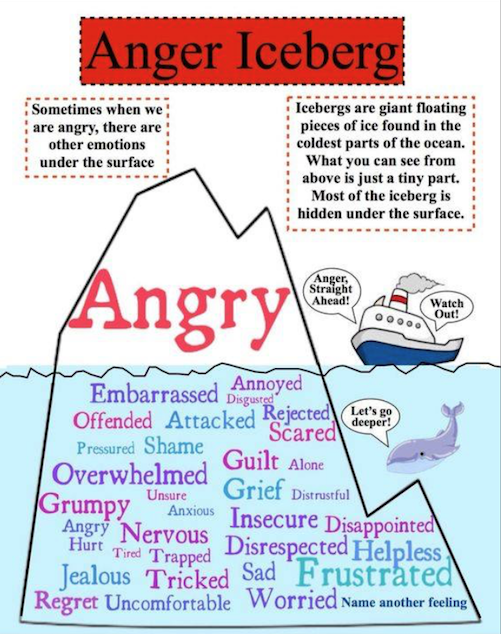A Word about Anger

Anger is no stranger to any of us! Everyone knows what it is like to feel angry and behave in angry ways, but how well do you understand your own, personal anger?
The “Anger Iceberg” was shared with me just a couple of weeks ago by a client and accurately depicts one really important fact: While anger may be the most visible manifestation of emotion, it is only the tip of an enormous emotional iceberg. And as long as we are unaware of the numerous factors that trigger our anger, we will be enslaved by this emotion.
Consider these observations:
- Anger is often understandable; that is, it makes sense that we react as we do, however . . .
- When someone behaves angrily, it is always about something else! Always! As indicated above, we may be triggered by a hundred different emotions. The challenge is to pause, take a deep breath and ask, “What is this really about?”
It may be about hurt, embarrassment, frustration, anxiety and many, many others, but as long as we don’t know and are unwilling to ask the question, we will be controlled by our anger.
- Anger can be used to intimidate, frighten, “win,” or harm another person. If that is what you really want to do, anger is a very effective means of accomplishing that. However . . .
- It is essential for us to understand the impact our anger has on other people, often the most important people in our lives–the people we love most. Our anger causes these people to feel threatened and unsafe!
When any of us feels threatened, our bodies immediately go into survival mode: fight, flight or freeze. It is not something we choose, it is an immediate, automatic response.
Effectively, then, anger creates distance between the angry person and the others who witness the anger.
So, the next question is: “Do you really want to connect and stay connected?” If so, there are very practical ways to work on that, but reacting with anger is not one!
- One more question: Do you understand what your anger is doing to you? Being persistently angry is one of the most damaging things we can do to ourselves.
Click on the image below to watch the video, “The Science of Anger.”
Categories
- A Word About
- Abuse
- Anger Management
- Anxiety
- Breast Cancer
- children
- Conflict
- Depression
- Disaster Recovery
- Divorce
- Dr. Harold Duncan
- Dr. Terri Gonzales
- Emotional Intelligence
- Grief
- Healthy Sexuality
- Index
- Katrina Giries
- Marriage
- News
- Parenting
- Photo
- Practice Update
- Safe Conversations
- Skype Counseling Sessions
- Stress
- The Meadows Series
- Uncategorized


Leave a Comment